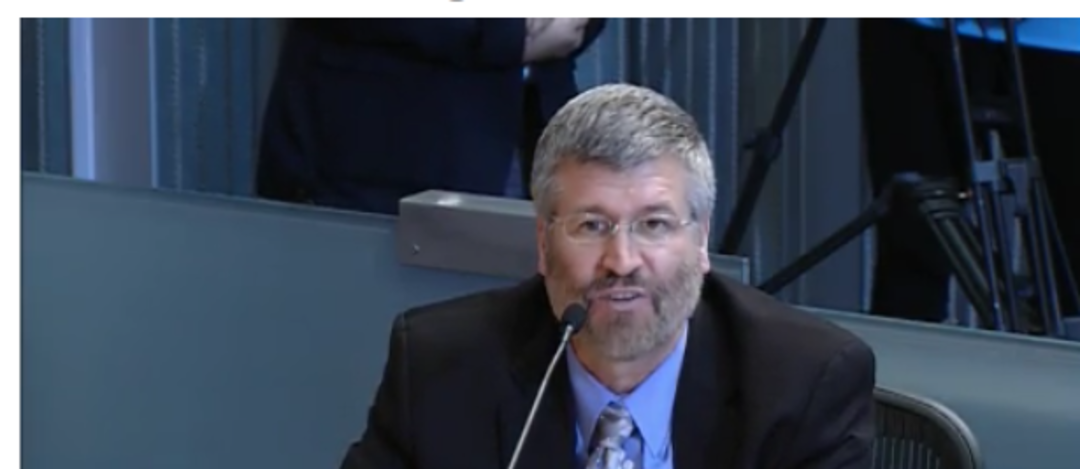Sawant Opponent Says Socialist Council Member Is "Divisive"

Caffeinated News
1. WSDOT's tunnel project manager Todd Trepanier scared the city council last month when he told City Council member Mike O'Brien during an emergency briefing on the stalled waterfront tunnel and cracked Pioneer Square walls that the agency had no more transit mitigation money and that the legisltuare had barred them from getting any more.
Actually, the legislature had authorized an extra $9 million in a mid-biennium budget proviso, WSDOT spokesman Lars Erickson tells me, and simultaneously, Gov. Jay Inslee's new 2015-17 budget proposal signs off on WSDOT's ask for $17 million in tunnel project transit mitigation money.
At the hearing, O'Brien was wary that a lag between the viaduct coming down and the tunnel opening up would require a big investment in transit mitigation money. He asked Seattle Department of Transportation Director Scott Kubly if there was money "set aside to help increase transit."
Kubly deferred to WSDOT, whose reps were sitting in the chambers. "WSDOT are you prepared to answer that?" an unusually exercised O'Brien asked.
"It's used to date," WSDOT tunnel project manager Todd Trepanier answered from the audience.
O'Brien: "So there's none left. That's a significant challenge, obviously."
Trepanier came up to the table to explain that the legislature passed legislation last session that "did not allow project dollars to go toward transit mitigation."
O'Brien (visibly stunned): "I missed that, but that's critical."

Todd Trepanier
I was stunned too and followed up this week with WSDOT, state house transportation chair Rep. Judy Clibborn (D-41, Mercer Island), and Seattle (and vice chair of transportation) Rep. Jessyn Farrell (D-46, N. Seattle). Reps. Clibborn and Farrell both explained that the budget proviso (added in the middle of 2013-15 biennium budget last session) was a response to the fact that WSDOT had used up the $30 million budgeted for transit mitigation—and needed to find more money. Specifically, the proviso (pg. 52, line 34 and pg. 79 line 10 the transportation budget) dictated that WSDOT couldn't tap the project mitigation fund.
"[WSDOT was] going to pay for it out of the tunnel contingency, which, for those of us who are waiting to see how this tunnel is going [chuckles] that is not where you go take money." —Rep. Judy Clibborn
But, Farrell says, they were also told "they had to find the money."
Additionally, the proviso, Clibborn says, mandated that WSDOT had to get approval for its transit mitigation funding plan from the legislature. "What happened with this particular account," Rep. Clibborn says, "is the money ran out last year, and ... without checking, [they] were going to pay for it out of the tunnel contingency, which, for those of us who are waiting to see how this tunnel is going [chuckles] that is not where you go take money."
Rep. Clibborn concludes: "The intent was not to stop them from doing it [spending money on mitigation], but for them find the money and then come back and tell us where they got it. We authorized it [$9 million] up front, but [said] don't take it out of the tunnel contingency."
Following the new guidelines, WSDOT then went and found $9 million from cash flow savings on 2005 gas tax road projects to cover the rest of the biennium which ends in June this year, WSDOT's spokesman Erickson tells me.
Meanwhile, Gov. Inslee's new transportation budget proposal calls for $17 million for tunnel project transit mitigation money in the next biennium. That tracks the $39 million that has been allocated over four and a half years to date.
WSDOT is coming back to city council to answer questions next Monday.
2. Rod Hearne, the former head of gay rights group Equal Rights Washington, filed to run against socialist City Council member Kshama Sawant this week in the newly drawn council District 3, from 520 on the north to I-90 on the south and from I-5 on the west to Lake Washington on the east, with left wing Capitol Hill at its heart.
The PI.com and the Seattle Times had the scoop on Monday.
Hearne, a white man who sits on a few progressive boards, but doesn't appear to need a job ("I don't have a cash flow problem" he acknowledged to me) seems like an awkward challenger to Sawant, a media sensation who led the popular $15 minimum wage campaign last year and, according to a poll, has great numbers in the district. (Sawant recently bought a $345,000 house at the southern edge of the district, though formerly lived in a condo on Capitol Hill.)
With the exception of Hearne's brief stint as ERW's executive director in 2011 and 2012 during the successful marriage equality campaign (he's gay), Hearne's resume could be seen as tepid and dusty.
Asked to outline his political background, Hearne, 47, cited his his volunteer and web master work for former Gov. Gary Locke, his web master gig for former former mayor Greg Nickels, and his job as campaign manager for failed Democratic state AG candidate Deborah Senn in 2004 (she lost to Republican Rob McKenna). He also noted that he's been a Democratic Party PCO. Currently, he's on a couple of liberal boards, including the board of Progressive Majority and an LGBTQ leadership building organization called Out in Front.
Hearne says Sawant has a habit of "undermining her allies."
His beef with Sawant? While he grants that "being a fighter for income equality and social justice, she's done some good work," he counters that her "divisive" style is a bad fit for the new districted system. He says Sawant has a habit of "undermining her allies;" he noted her campaign of "nasty rhetoric" when she ran against "low-income housing champion" state Rep. Frank Chopp (D-43, Wallingford.) "Her mission for low-income housing is to attack Frank Chopp? Low-income housing is the reason he's in the legislature." Chopp, the longtime director and now senior advisor for the low-income advocacy group Solid Ground, has a record as speaker of the house in Olympia of securing money for the low-income housing trust fund.
(Hearne's criticism about tweaking her allies does have some merit: For example, I wrote about an angry email that King Count Labor Council leader David Freiboth sent to council last October complaining about Sawant for "misleading" the council about KCLC's stand on the city budget.)
Hearne extends the criticism, adding: "The position that she was elected to is different from the new role" where, he says, it's important to build alliances across literal boundary lines and focus, as he says he wants to, "on prosaic neighborhood issues like making the Capitol Hill light rail station work and on making sure we have the resources to match our growth." He noted that Boston, a city roughly similar in size to Seattle, has twice as many police officers.
I asked him about one prosaic neighborhood issue: What did he think of the city council legislation that reined in microhousing development. Calling the general issue "a bit of a balancing act because there's lot of anxiety about increasing density and not having resources like parking, that's what I'm hearing," he said, he didn't take a position on the bill (which put a minimum requirement on square footage and mandated two sinks per unit). He started to criticize the council for another piece of legislation, noting the "irony" that the council loosened rules on living in tents, but then backed off that point saying he didn't know enough about the tent legislation. The legislation, sponsored by council member Nick Licata in 2013 would have let people to live in tents longer than is currently allowed in some non-residential zones. It lost 4-5.

Ultimately, it's impossible not to view the race as a referendum on Sawant. Word is the chamber and Mayor Ed Murray have been pounding the pavement looking for someone to challenge her. (Hearne and his former domestic partner, political consultant Roger Nyhus, held a fancy fundraiser for then-candidate Ed Murray back in 2013. Murray, a former gay state senator, was the star of Washington state's marriage equality movement.) Hearne, who, by the way, says "the great irony" of his life was that he divorced Nyhus just six months after gay marriage became legal, sums up Sawant as "far more power driven than mission driven."
ACLU lawyer and marijuana legalization poster child Alison Holcomb had said last July she was going to run against Sawant, but is now heading up a national ACLU campaign against mass incarceration. Another name that has been mentioned is International District business and community leader Don Blakeney.
3. Speaking of city council campaigns: Incumbent council member Sally Bagshaw, who's running unchallenged so far in her downtown District 7 seat, had to send out an apology email after some invites to her campaign kick off event went out from her city account.




